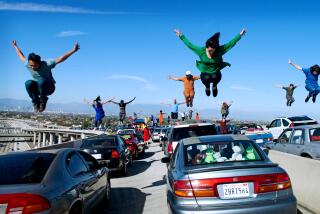Equal Play
- Share via
If 7-year-old Klash Virgen were to visit the playground at Park Center in Griffith Park, he would find himself stranded on the sidewalk.
Klash, who uses a wheelchair, would be unable to maneuver through the sea of sand underneath the slides and swings. To use the restroom, he would have to make his way over an uneven asphalt path, only to find that the concrete restroom stalls were too narrow to fit his wheelchair.
“Whenever I go to the playground I get sad because I can’t play with all my other friends,” Klash told the City Council on Tuesday. “I get left behind a lot.”
Following an appeal from the boy, one of dozens of disabled children who visited council chambers Tuesday, the council voted to set aside 2 acres at Griffith Park for a new playground that will serve disabled and able-bodied children alike. It will be the first such facility in California.
The council’s action, urged by a teary-eyed Councilman Mike Feuer, paves the way for Shane’s Inspiration, a wondrous world where children in wheelchairs could roll, chair and all, onto large platform swings or play at waist-high sand tables instead of hard-to-reach sandboxes on the ground. Eighty percent of the equipment at the “boundless” playground could be easily used by disabled children.
Shane’s Inspiration is the legacy of a baby born last year to Catherine Curry-Williams and Scott Williams, a Valley Village couple. Their son, Shane, was born paralyzed, unable to breathe on his own, in March of last year. He died when he was 14 days old.
“He’s in our life and he’s in our memory,” said Curry-Williams. “And his memory will be in all the children who have never been able to play in a playground, playing.”
Inspired by a similar playground in Connecticut, the couple started Shane’s Inspiration, an organization that will raise $600,000 to design and build a park with the same name in Los Angeles. They have secured about $100,000 so far, including large donations from the producers of the television show “Friends” and the Paul Newman Foundation.
“The playground is by no means our way of hanging onto our son,” said Williams. “He’s with us anyway. He opened our eyes and my eyes just to the possibility of having a child who was going to spend his life in a wheelchair.”
The city’s Department of Parks and Recreation has 58 playgrounds out of 296 that comply with the federal Americans with Disabilities Act.
But, said Richard Sessinghaus, the department’s interim manager, “There’s a difference between what is accessible and what is playable.” The agency supports the creation of a park where all children can play to the best of their abilities.
The Parks Department estimated it would cost the city $150,000 to remodel the Park Center restroom to make it wheelchair accessible, $32,261 per year for a gardener, and $5,000 for signs.
“We can go beyond the law, because mere access is not enough,” Feuer told his colleagues, his voice breaking as he faced the rows of children in wheelchairs and leg braces. “And simply saying ‘you play over there in your place and we’ll play over here’ is not enough.”
Lucy Virgen, Klash’s mother, said the frustration she feels when she takes her son to ordinary playgrounds is so intense that she avoids them altogether.
“All he can do is sit and play in the sandbox,” she said. “I have to sit next to him because there are other children playing and they might knock him over.”
She even avoids driving by parks, hoping her son will not see them and beg to go. “It’s too painful for me to see him there,” she said. “How can I tell my child, ‘It hurts me when I see that you can’t play with the other kids’?”
Shane’s Inspiration has encouraged disabled children to help design the park. And several youngsters at the council meeting had definite ideas about what an ideal playground would have.
“We would start by thinking of people,” said Andriana Thomas, 9, her pink crutches resting by her side. It would have swings, of course, and monkey bars. “Especially for the little kids who have crutches, we want to make sure they don’t fall,” she said. “So it would need special carpeting.”
Her friend, 7-year-old Shannel Pittman, suggested wheelchair races and a merry-go-round.
Chloe Blohm, 7, piped up with another playground prerogative. “An ice cream truck,” she said. “I want a lot of picnics.”
More to Read
Sign up for Essential California
The most important California stories and recommendations in your inbox every morning.
You may occasionally receive promotional content from the Los Angeles Times.













